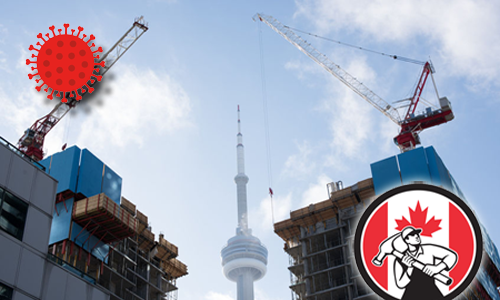HOW COVID-19 IS IMPACTING ON CONSTRUCTION IN CANADA
There’s a lively debate taking place in the construction industry across North America, including Ontario, as stakeholders and policy makers grapple with the effects of the coronavirus on the sector.
“There is a lot of panic,” said Craig Lesurf, president of Gillam Group. “Everybody wants to know what is going on. Some people are saying we are not reacting enough and some are saying we are reacting too much.”
One thing appears certain amidst the ferment in the sector — the pandemic is causing significant stresses as managers and workers take stock of slowdowns that are already happening and contemplate next steps in construction offices and particularly on jobsites.
A crucial discussion is whether construction jobsites should be exempt from shutdowns that have affected many other workplaces in the province. Ontario Premier Doug Ford specifically excluded the sector March 17 in announcing the mandatory closure of a long list of activities and businesses as part of the provincial state of emergency. Ministry of Labour, Training and Skills Development spokesperson Janet Deline issued a statement when asked for clarification: “The orders associated with yesterday’s declaration of emergency only apply to the specific establishments listed, as well as organized public gatherings. Private workplaces like factories are currently exempt.”
Error, group does not exist! Check your syntax! (ID: 4)
In the U.S., the Associated General Contractors of America issued a statement that argued, “Halting construction activity will do more harm than good for construction workers, community residents and the economy.”
‘Worker health and safety must be paramount and flattening the curve is our highest goal,’ — Ian Cunningham, Council of Ontario Construction Associations
But the mayor of Boston has called for a city-wide suspension of all regular construction activity as a means of keeping workers safe and stopping the spread of the virus, and across the continent, B.C. Construction Safety Alliance executive director Mike McKenna asked whether keeping construction jobsites in operation outweighed safety considerations.
“Is getting a building finished essential? A hospital is maybe essential, but I can’t think of an instance where finishing a mall or a three-storey walkup is essential. What is essential is keeping those workers safe,” McKenna told the Journal of Commerce.
Council of Ontario Construction Associations president and COO Ian Cunningham said he does not believe construction sites should be shut down at this time but argued that the construction sector should not be exempt from the collective responsibility being thrust on other sectors to stop the spread of the virus.
“Worker health and safety must be paramount and flattening the curve is our highest goal,” he said. “I am advocating for the most stringent precautions possible on construction sites to safeguard our workers. The last thing we need at a time when there is already a severe shortage of skilled construction workers is to put them at risk.”
Cunningham said only certain construction activities should be considered essential such as maintenance work on power plants or hospitals.
“But other construction work I don’t see as essential,” he remarked. “The last thing we want is to spread the virus to a construction site that further exacerbates this thing. Let’s get this thing with a sledgehammer.
“We are all part of this. Ignoring the advice of public health authorities only presents an opportunity for the further spread of the thing we are trying to avoid.”
‘We have to look at this on an objective basis and not panic,’ — Craig Lesurf. Gillam Group
Lesurf serves as chair of the Ontario General Contractors Association’s safety committee and his firm’s fact sheet on dealing with the virus was identified in a recent OGCA newsletter as representing best practices. The newsletter noted that a number of jobsites have been disrupted by the virus. Lesurf said he anticipated more disruptions to come.
“Every site has been affected directly or indirectly,” he said. “People are distracted, they are not focusing on the tasks at hand as much as they could be or should be, not everybody is showing up, there is a supply chain that is affected. I am worried about the deliveries I am going to be getting months from now, that aren’t being made because a factory is shut down somewhere, or if I have Italian marble coming, I am not getting it.”
Gillam Group has taken extensive steps to protect its workers and stop the spread of the virus at its administration offices and Lesurf said by being “smart” workers on jobsites can be protected as well.
“I have said this before, leaders need to lead,” he said. “One of the things we need to do is not instill panic but we instill the educational things people need to do as the situation changes.”
Lesurf said shutting down workplaces would be highly detrimental to the economy.
“If you look at the overall numbers, the odds are very, very low that you are going to come into contact with someone who is one of those cases,” he said. “It is about not hitting the panic button, not as a construction thing but as a country, we have to realize that if we shut down, restarting our economy is very, very tough. Companies will be hurt.
“In construction, we try to keep a civil head. That is one of the things we do, we manage risk for a living. We put plans in place, we organize.”
And people still need to pay the bills, he argued.
“I get that we have to be safe and I am all for it,” he said. “It is about being smart. We have to look at this on an objective basis and not panic.”
Source: Daily Commercial News









Leave a Reply
Want to join the discussion?Feel free to contribute!